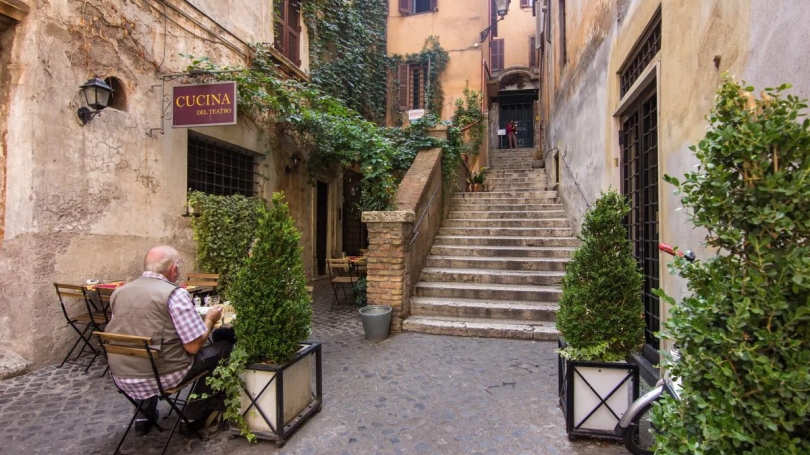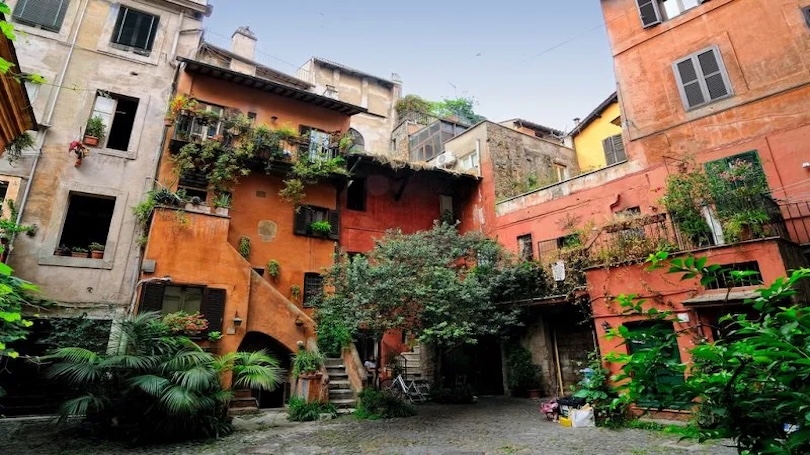
Italian 1 @ 10 Ciniglia and @ 11 Alberti. An introduction to Italian as a spoken and written language, with emphasis on practical conversation. The course includes regular practice in class and scheduled drill-sessions in understanding and using the spoken language. Does not serve in partial satisfaction of the Distributive or World Culture Requirements. This course is not open to students who have received credit for ITAL 11.
Italian 2 @ 11 Ciniglia and @ 12 Alberti. Rapid review and continued study of the fundamentals of Italian, with intensive work in vocabulary building. The course will also include an introduction to the culture and civilization of Italy. Open to students by qualifying placement or to students who have passed ITAL 1. Does not serve in partial satisfaction of the Distributive or World Culture Requirements. This course is not open to students who have received credit for ITAL 11.
Italian 3 @12 Gilebbi. This course is designed to reinforce and refine spoken and written language skills through a review of grammar, exposure to a broad spectrum of language ranging from colloquial to literary styles, and the use of samples of Italian language from multiple sources such as advertising, comics, television and literature. Frequent compositions, quizzes, plus linguistic and thematic analysis of texts. Open to students by qualifying placement or to students who have passed ITAL 2, ITAL 11 or ARTH 12. Does not serve in partial satisfaction of the Distributive or World Culture Requirements.

Italian FYS 07.08 -Gilebbi@ 2. What is Italian Cinema? Cinema is a form of expression that, by integrating different media and disciplines (including writing, music, dance, theater, architecture, fashion, etc.) creates something that is beyond the sum of its parts. But how does cinema integrate all these other media into something new? What are the specific tools needed to read, understand, and critically analyze this multifaceted form of expression, and how can we use them effectively?
COLT 19-Translation: Theory and Practice @ 11 Canepa: Translation is both a basic and highly complicated aspect of our engagement with literature. We often take it for granted; yet the idea of meanings "lost in translation" is commonplace. In this course we work intensively on the craft of translation while exploring its practical, cultural and philosophical implications through readings in theoretical and literary texts. All students will complete a variety of translation exercises, and a substantial final project, in their chosen language. Degree Requirement Attributes: Dist:INT or LIT; Lang:LRP; WCult:W. Proficiency in a non-English language at the intermediate level required. Students of Italian can count COLT 19 for their Italian major/minor.

Italian 9-Convertini @ 11:Italian Culture--This course students will analyze some of the most significant Italian cultural, social, and political themes from the 60's to present. Through the viewing of the film La Meglio Gioventù (2003), blogging, and creative writing assignments, students will strengthen their ability to express ideas in both the written and spoken language. NRO eligible. Dist:LIT; WCult:W. Prerequisite: ITAL3 or permission of the instructor. NRO eligible.

FRIT 31: How Languages are Learned: Convertini @ 12: Many approaches to language teaching and learning have been proposed and implemented over time. From learning grammar rules and lists of vocabulary to memorization and practice of correct sentences to natural communication, project work, communicative language teaching, and content-based learning, this course will introduce students to some of the language acquisition research that will help them understand how languages are learned. Topics explored in the course will include language awareness, bilingualism, early-child language learning, the major trends in twentieth-century language teaching, and the role of technology in language learning. The course will also offer students the opportunity to reflect on language learning on a personal level, to find out how they think as language learners and how they can empower themselves to learn languages in an active and engaged manner. Hands-on activities, including class observations, textbook evaluations, and interviews with language learners, will complement the course. Open to all students. Text, lectures, and discussion in English. Students taking the course for major or minor credit in Italian will attend a weekly x-hour and do all written work in Italian. Not open to students who have received credit for FRIT 093. Degree Requirement Attributes: Lang:LRP; Dist:SOC; WCult:W. NRO eligible.

Italian 26-Italian Cinema-@ 2 Parati: Conducted in Italian, this course introduces students to classic Italian cinema, including its history and its predominant genres—from the silent film to comedy and melodrama and thriller. Students will become familiar with Italian cinematic movements such as Neorealism, directors such as Federico Fellini and Roberto Benigni, and with important concepts in film analysis. Prerequisites: A course in the Italian 10 series. Degree Requirement Attributes:Dist:ART; WCult:W.
- Undergraduate
- Study Abroad
- Careers and Opportunities
- Overview
- Internships
- Apprentice Teacher Info
- Student Awards and Prizes
- Arianna Pagani ’93 Memorial Prize In French And Italian
- Bruno Tollon Prize In French Studies
- Cloise Appleton Crane Prize In French And Italian
- François Denoeu Memorial Prize
- French Consulate Prize
- George E. Diller Memorial Prize
- Lawrence And Sheila Harvey Prize In French And Italian
- Paul D. And Marilyn M. Paganucci Prize In Italian
- Pray Modern Language Prize In French And Italian
- Ramon Guthrie Achievement Award In French
- The Colette L. Gaudin Prize in French
- Thomas J. Gaudet, Jr. Memorial Prize
- Endowed Research Grant
- Lectureship opportunities in Lyon and Toulouse
- What you can do with a major or minor in French and Italian
- News & Events
- People
Back to Top Nav
Back to Top Nav
Back to Top Nav
Back to Top Nav